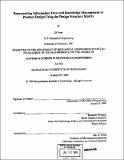Representing information flow and knowledge management in product design using the design structure matrix
Author(s)
Dong, Qi, 1973-
DownloadFull printable version (11.86Mb)
Advisor
Daniel E. Whitney.
Terms of use
Metadata
Show full item recordAbstract
The design of complicated products such as automobiles requires timely coordination of many departments in an organization in order to win the time-to-market competition globally. Ford approaches this challenge with the Ford Product Development System (FPDS) based on systems engineering philosophy. Reusing the past engineering design knowledge helps to speed up the product development process. The Ford Direct Engineering (DE) program semi-automates the product design process and increases the knowledge re-use capability of the organization. This thesis uses the Design Structure Matrix (DSM) method to study the design processes of three cases at Ford: the vehicle door internal subsystems, the throttle body system interface, and the throttle body assembly. The results of studies recommend the sequence of the design tasks for the DE programs. The existence of design iterations shows the current DE computer programs cannot automate the design process without involving human interactions. DSMs provide means to integrate individual DE programs, and suggest how to form teams based on the design issues rather than the traditional organization divisions. DSMs and their companion information databases can serve as browsers for design knowledge reuse, and define knowledge ownership. DSM can also quantitatively compare the complexity of two design alternatives. The three cases reveal that most knowledge captured is at lower level of the decomposition such as parts. System level knowledge is less understood and documented. This thesis also compares the DSM method to the Associativity Map method and the Datum Flow Chain method. The accuracy and the effectiveness of the DSM method depend on the knowledge acquisition process and the data representation format. Incorporating timing with DSM improves the scheduling of tasks. This thesis discusses what knowledge DE or general Knowledge Based Engineering (KBE) should possess as well as the impact of the DE and KDE applications on the organization and the challenges they face.
Description
Thesis (S.M.)--Massachusetts Institute of Technology, Dept. of Mechanical Engineering, 1999. Includes bibliographical references (p. 169-171).
Date issued
1999Department
Massachusetts Institute of Technology. Department of Mechanical EngineeringPublisher
Massachusetts Institute of Technology
Keywords
Mechanical Engineering